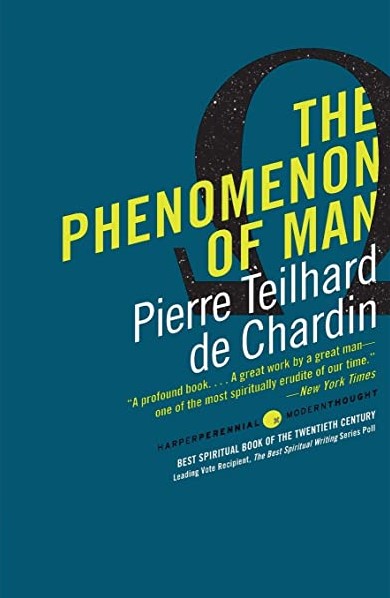
In The Phenomenon of Man, Pierre Teilhard de Chardin presents a complex and genre-defying account of the history and future of mankind. He attempts to prove mankind’s special status as co-creators both scientifically and philosophically. As a paleontologist, philosopher, and Jesuit priest, Pierre was uniquely qualified to talk about the phenomenon of man from such a multi-dimensional perspective.
And his conclusion is rather shocking: that evolution enlivens Christianity rather than rendering it irrelevant. And he states this very plainly:
“Though frightened for a moment by evolution, the Christian now perceives that what it offers him is nothing but a magnificent means of feeling more at one with God and of giving himself more to him. In a pluralistic and static Nature, the universal domination of Christ could, strictly speaking, still be regarded as an extrinsic and superimposed power. In a spiritually converging world this Christic’ energy acquires an urgency and intensity of another order altogether. If the world is convergent and if Christ occupies its centre, then the Christo- genesis of St. Paul and St. John is nothing else and nothing less than the extension, both awaited and unhoped for, of that noogenesis in which cosmogenesis-as regards our experience- culminates. Christ invests himself organically with the very majesty of his creation. And it is in no way metaphorical to say that man finds himself capable of experiencing and discovering his God in the whole length, breadth and depth of the world in movement. To be able to say literally to God that one loves him, not only with all one’s body, all one’s heart and all one’s soul, but with every fibre of the unifying universe…. Evolution has come to infuse new blood, so to speak, into the perspectives and aspirations of Christianity.”
As a Christian who has long been baffled by other Christian’s inability to reconcile their faith with the facts of evolution this appealed to me greatly. However, it wasn’t exactly well received at the time. His opinions outraged both the scientific and religious establishment at the time earning him censorship from the Catholic church and scathing critiques from other scientists. But more recently things turned around and his work has received praise from Pope Benedict XVI, was cited as prophetic and profound by secular writers and publications such as Jamie Wheal and Wired magazine, and The Phenomenon of Man was even voted the best spiritual book of the 20th century. It seems to me that it was just a bit ahead of its time.
The book begins by giving a detailed account of what was known about the history of the universe and the evolution of life on earth including the patterns, trends, and critical points of transformation. He discusses what evidence has been found in fossil records and what hasn’t and wont be found and why. And he argues that evolution, having found a suitable form in man, has shifted inward and is now at work evolving consciousness, specifically a kind of collective consciousness which he calls the “noosphere”. He says that in mankind evolution is becoming conscious of itself and that we are uniquely able to co-participate in this process which has been ongoing since long before humans existed.
He also presents a prophetic vision of the next critical point in the evolution of consciousness, a point which he calls “omega”, and which is supposed to be the culmination of evolution. The omega point is a kind of supreme super-consciousness in which all consciousnesses will commune together in a sort of unity in which each person will remain conscious of itself while also being part of a greater whole.
“In any domain-whether it be the cells of a body, the members of a society or the elements of a spiritual synthesis-union differentiates. In every organised whole, the parts perfect themselves and fulfil themselves.”
“Through neglect of this universal rule many a system of pantheism has led us astray to the cult of a great All in which individuals were supposed to be merged like a drop in the ocean or like a dissolving grain of salt.”
This is one of the ways in which he stands out from other philosophers who propose other forms of teleological unity. For Teilhard, the great reunification of consciousness at the end of time is not one in which we lose our sense of self, our personality, and our uniqueness. If that were the case, he argues, we wouldn’t have developed such things in the first place. Rather he says that it will be a kind of “hyper-personalization”.
It’s an incredibly profound book which reshapes what it means to be human and places us firmly within and at the center of Nature rather than separate and apart. Not only that, but he shows how a deep understanding of evolution can revitalize our spiritual life rather than rendering it irrelevant.
Similar to many of the other books I’ve reviewed, The Phenomenon of Man proves that science and religion can come together to produce meaningful and valuable insights which both further our understanding of the world around us and deepen our sense of meaning and connection.
I do have to admit that it was a somewhat difficult read. In the beginning, I felt like I was struggling to fully grasp what he was saying. But, as I stuck with it, it all started to come together and got more used to his writing style and vocabulary. And by the end I was awestruck by the depth and profundity of it all.
If you stick with it, it definitely pays off.
If that sounds interesting to you, you can pick up a copy using the link below.👇
(Link to purchase: The Phenomenon of Man)
Thanks for reading!
Love,
Justin
❤️🙏☀️
